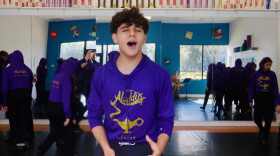More than 100,000 Venezuelans gathered in Miami-Dade, Broward and Palm Beach Counties on Sunday to vote against president Nicolas Maduro's efforts to change the country's constitution.
"I am here supporting my people. I have been here [in the U.S.] for 25 years but Venezuela is still in my heart and I want to see change," said Alejandro Heredia, 36, from Maracay and now living in Doral.
Heredia was one of the 23,934 Venezuelan citizens that waited patiently in line outside of the University of Miami's Watsco Center to participate in the symbolic referendum. According to the organizers, 30,000 people voted in two locations in Doral; 14,451 in Aventura; 16,848 in Weston, 13,044 in Fort Lauderdale and 4,473 in West Palm Beach. At the end of the day, 102,750 votes were cast in South Florida.
Long lines but high spirits as thousands of #Venezuelans wait in Coral Gables to vote in opposition-called consult @WLRN #venezuela pic.twitter.com/1KiPVfOl0e— Teresa Frontado (@tfrontado) July 16, 2017
The referendum, organized by the Venezuelan opposition, was celebrated simultaneously in the Latin American country and around the world. Citizens were invited to answer yes or no to three questions, dealing with Maduro's call for a new Constitutional Assembly, the recent role of the Bolivarian National Guard in repressing protests inside the country and the renewal of government powers.
The results of this vote are not binding but that didn't dampen the spirits of the participants in South Florida, who sang, danced and cheered while they waited patiently -sometimes for more than an hour- under the unforgiving South Florida sun.
"Voters are very happy. People are euphoric. Yes, yes, yes for Venezuela," said Angel Rodriguez, one of the hundreds of volunteers assisting at ballot locations in Doral.
In Doral we can still see hundreds gathered under the extreme heat waiting to cast their ballots. #Venezuela @WLRN pic.twitter.com/Pejt5yHC9x— Adrianne Gonzalez (@Coohps) July 16, 2017
"I got here about an hour and a half ago and I was a little overwhelmed with the lines, but it's for a good cause and you just have to do it. Being away from Venezuela, I can't be there on the streets so this is part of me giving back to my country," said Heredia while waiting in line in Coral Gables.
Once inside, voting was a breeze. Thousands of #Venezuelans still in line in Coral Gables to vote this afternoon @WLRN pic.twitter.com/xvear3OxGL— Teresa Frontado (@tfrontado) July 16, 2017
This is the first time that Venezuelans in South Florida have had the opportunity to participate in a popular vote since 2012, when the government in Caracas closed the consulate in Miami. Ever since, citizens willing to vote in elections have had to travel to the consulate in New Orleans.
"I am here to vote, I am trying to get this government out of our country," said Barbara Aguilar, 41, while waiting in line at the Coral Gables location with her husband and two young children. "I am sure that my vote is going to make a difference."
Luis Rodriguez is one of thousands in Miami protesting and voting against #Venezuela's President's plans to change their constitution @WLRN pic.twitter.com/ZFCoZtlp7o— Adrianne Gonzalez (@Coohps) July 16, 2017
Copyright 2020 WLRN 91.3 FM. To see more, visit WLRN 91.3 FM. 9(MDAyMTYyMTU5MDEyOTc4NzE4ODNmYWEwYQ004))









